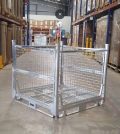Lubrication: Ensure Smooth Operation & Avoid Unnecessary Repair Work
No matter the industry you work in, at some point you’re going to have to become familiar with friction – what is it, why is it important and how should you manage it to make the most out of your machines, plants and vehicles. The easiest way to define friction is as a force that resists the relative motion between two bodies that are in a constant contact. Meaning, thanks to friction, the bodies that produce movement when in contact, can stop moving. Think of it as a force that is much needed for sort of a ‘cyclic’ functioning that implies a beginning and an end. Without the friction part, there’d be no end.

However, a lot of friction isn’t necessarily a good thing. A lot of friction means hard movement, interrupted movement and as a final result, very slow, or completely unfinished mechanical work. Which means, it needs to be regulated and maintained at an optimal level. That’s where proper lubrication comes in.
To understand the importance of lubrication in industrial uses, you first need to understand the damage high friction can do. It can easily result in severe damaging of the two surfaces making contact. This may sound very normal to you – you’d just replace the damaged parts and think you’re done. But when these parts are from machines that have a huge impact on your industrial production, the safety of your workers and environment, as well as on the overall functioning of the plant, you’d think twice. A damage of this kind translates into unplanned, high costs for repairs or replacements that could stop the entire functioning of the plant in a moment.
Now that you have the right picture of just how important friction management is, let’s see how lubrication, as part of the industrial supplies that you should own, can help you prevent any damage done by it.
A lot of the parts in modern machinery work at high temperatures and increased speeds under a demand for high accuracy and reliability. That requires a careful selection of a lubricant. A proper lubricant, one that can really make a machine function at an optimal level, would have the following characteristics:
- friction and wear reduction by providing a hydrodynamic film of strength and thickness to support the load;
- oxidation and corrosion prevention of the bearing rolling elements;
- contaminants prevention;
- acts as a heat transfer agent.
Among the vast palette of industrial supplies, you can find many different types of lubricants depending on the type of mechanical part you’d be using it on. For instance, if you need a lubricant for smoothing the work of bearings, you can choose one from the three main categories: oils, greases or solid dry film lubricants. An additional criteria for choosing the proper lubricant would be the operating conditions and the limitations the specific bearing system has.
Other industrial supplies you should get to make the lubrication process easy, mess-free and precise, include nozzles and guns. Nozzles and guns can be either cylindrical or round and mainly serve to control a jet of gas or a liquid. In the lubrication process, which needs to be done in a highly controlled and measured manner to a precise area, nozzles and guns are almost a must. Their shape however, would largely depend on the bearing system on which lubrication is applied and some other engineering considerations.








